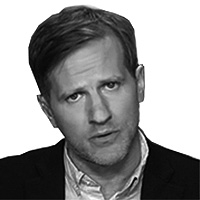In a 1731 essay on Shakespeare’s “brilliant monstrosities,” Voltaire confessed to readers that he added his own stylistic flourishes to a self-translated passage from Hamlet: “Woe to the makers of literal translations, who by rendering every word weaken the meaning!”

It’s an admonition appreciated by the Islamic Republic of Iran’s official translator, whose services were employed by CNN for an interview with the country’s vaunted “moderate” leader, Hassan Rouhani. Christiane Amanpour, an Iranian-Brit who apparently speaks Farsi, asked the inevitable question, the one that would uncover further evidence of moderation and counterbalance the sinister views of former Iranian President Mahmoud Ahmadinejad, who famously revealed himself to be an amateur scholar of the Second World War: Does the right honorable gentleman from Tehran believe the Holocaust actually happened? The translator, perhaps fearing that rendering every word would weaken the meaning, offered the following English rendering of Rouhani’s response:
“I’ve said before that I am not a historian and that when it comes to speaking of the dimensions of the Holocaust, it is the historians that should reflect on it. But in general I can tell you that any crime that happens in history against humanity, including the crime that Nazis committed towards the Jews as well as non-Jews is reprehensible and condemnable. Whatever criminality they committed against the Jews, we condemn...”
A bit slippery, but surely an improvement over Ahmadinejad's contention that Auschwitz was an elaborate hoax. But according to the Fars News Agency—which is just like a real news agency, except run by Iran’s psychopathic Revolutionary Guards—this wasn’t exactly what Rouhani said:
“I have said before that I am not a historian and historians should specify, state and explain the aspects of historical events, but generally we fully condemn any kind of crime committed against humanity throughout the history, including the crime committed by the Nazis both against the Jews and non-Jews, the same way that if today any crime is committed against any nation or any religion or any people or any belief, we condemn that crime and genocide. Therefore, what the Nazis did is condemned, (but) the aspects that you talk about, clarification of these aspects is a duty of the historians and researchers, I am not a history scholar.”
*The Wall Street Journal verified the broad strokes of the Fars News Agency translation (no one else bothered), and there are indeed subtle but substantial difference between these two versions. So to recap: CNN probably botched a Farsi translation and an official Iranian news agency rushed to its leader’s defense, lest the libel spread that he acknowledged the Holocaust as a real historical event.
But while Revolutionary Guards philologists are rather insistent that Rouhani never said “Holocaust,” condemned “whatever criminality [the Nazis] committed against the Jews,” or said the word “reprehensible,” all agree that he employed the old Holocaust deniers tricks of “questioning” the death toll, averring that many others groups were also victims, and claiming that a well-established historical fact requires further examination by “historians and researchers,” while repeatedly pointing out that he is “not a historian” (Ahmadinejad told NPR in 2010, that he was “not a historian” but that “we should allow researchers to examine all sorts of questions because it's quite clear that when they do, they will reach different conclusions"). And even in CNN’s translation, Rouhani condemns unspecified “crimes,” while encouraging historians to “clarify” what actually happened.
It’s important to remember that the skilled Holocaust denier parses, dissects, and molests language, quibbling with the word “denial”—they typically acknowledge that many Jews died, but were victims of various typhus epidemics—and wondering why shadowy forces are hamstringing dissenting historians.
So Rouhani’s view of Holocaust historiography is, broadly, the position staked out by bonkers British historian David Irving. And The New York Times routinely—and correctly—tags Irving with the Holocaust-denier label. So how did they describe Rouhani? In an account headlined “Iran’s Leader, Denouncing Holocaust, Stirs Dispute,” Times writers Mark Lander and Thomas Erdbrink described Rouhani’s remarks as a “frank acknowledgment and condemnation of the Holocaust” (after I tweeted my objection to the line, the Times quietly removed the word “frank,” though didn’t acknowledge the change). Mediaite headlined, “Iranian President: I Won’t Deny Holocaust Happened, It Was ‘Reprehensible and Condemnable.’” On Amanpour’s CNN blog: “Iran's new president: Yes, the Holocaust happened.” It was almost enough to nominate Rouhani as a Righteous Among the Nations at Yad Vashem.
Aren’t our moral standards for Iranian theocrats rather too elastic? It’s lovely that Iran’s new moderate president wants to moderate his government’s reputation for being a viper’s nest of lunatics, thugs, and anti-Semites, but must so many representatives of the fourth estate—a wholly owned arm of the you-know-who lobby—be willing to redefine “moderation” and “condemnation” along Iranian lines? Using the definition accepted by mainstream scholars of Nazism, Rouhani is a moderate Holocaust denier.
In a theocratic state governed by force and fear, I guess this counts as progress.
*Since the publication of this piece, CNN has strongly disputed the Wall Street Journal’s account of Rouhani’s speech. The author of the Journal story has fired back on Twitter.
Such is the way with Farsi, it seems, considering there is still no consensus whether President Ahmadinejad promised to “wipe Israel off the map.” But as I said above, the point of Rouhani’s “moderate Holocaust denial” remains unchanged "even in CNN's translation"—using the classic formula of “questioning the numbers,” not uttering the word “Holocaust,” and saying historians need to further investigate the matter.






